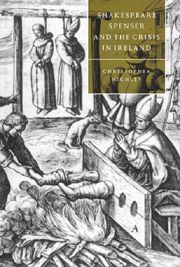Book contents
- Frontmatter
- Contents
- List of illustrations
- Acknowledgements
- Introduction: Elizabeth's other isle
- 1 Spenser's Irish courts
- 2 Reversing the conquest: deputies, rebels, and Shakespeare's 2 Henry VI
- 3 Ireland, Wales, and the representation of England's borderlands
- 4 The Tyrone rebellion and the gendering of colonial resistance in 1 Henry IV
- 5 “A softe kind of warre”: Spenser and the female reformation of Ireland
- 6 “If the Cause be not good”: Henry V and Essex's Irish campaign
- Notes
- List of works cited
- Index
- Cambridge Studies in Renaissance Literature and Culture
3 - Ireland, Wales, and the representation of England's borderlands
Published online by Cambridge University Press: 04 December 2009
- Frontmatter
- Contents
- List of illustrations
- Acknowledgements
- Introduction: Elizabeth's other isle
- 1 Spenser's Irish courts
- 2 Reversing the conquest: deputies, rebels, and Shakespeare's 2 Henry VI
- 3 Ireland, Wales, and the representation of England's borderlands
- 4 The Tyrone rebellion and the gendering of colonial resistance in 1 Henry IV
- 5 “A softe kind of warre”: Spenser and the female reformation of Ireland
- 6 “If the Cause be not good”: Henry V and Essex's Irish campaign
- Notes
- List of works cited
- Index
- Cambridge Studies in Renaissance Literature and Culture
Summary
What little attention has been given to the impact of Ireland and Irish affairs upon the Elizabethan theater has usually stopped at noting allusions and tracing the emergence of the comic Irishman as a stock dramatic character. My argument, by contrast, is the larger one that Ireland – as the locus of recurrent political crises and a testing ground for categories of national identity in the 1590s – represented a compelling, if always displaced and elusive, subtext for a politically engaged public theater. In later chapters I return to Shakespeare's complex and evolving relation to the subtext of Ireland; in this chapter I want to explore further the representational strategies developed by writers both in and out of the theater for handling the “problem” of Ireland in ways that preserved the fictional distance required by the spoken and unspoken rules of censorship surrounding the performance and publication of texts. Specifically, I examine how within the British mainland, Ireland was discursively mapped in the context of a larger set of discourses about England's Celtic borderlands, discourses that made particular use of the fraught connections between Ireland and Wales. Although my discussion of Welsh materials may seem like a detour, a swerving away from the central focus on Ireland, the texts I traverse invariably point through Wales to Ireland, albeit an Ireland that often takes the form of a powerfully felt absent presence. By foregrounding two non-canonical works, David Powel's chronicle The Historie of Cambria now called Wales (1584) and George Peele's play Edward I (c.1590), I mean, first, to recover largely ignored works for a new cultural history of early modern Britain, and, second, to delineate the full breadth of the discursive field to which the canonical works of Shakespeare and Spenser belong.
- Type
- Chapter
- Information
- Shakespeare, Spenser, and the Crisis in Ireland , pp. 67 - 85Publisher: Cambridge University PressPrint publication year: 1997
- 1
- Cited by

